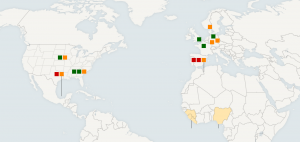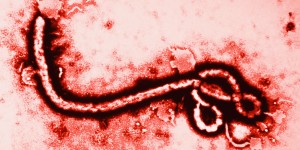
While protecting her own borders, Israel sends
aid to Africa to prevent and fight Ebola.
By Joel Leyden
Israel News Agency
Jerusalem, Israel — October 12, 2014 … Part of the following was communicated by the Prime Minister’s Office to the Israel News Agency.
Israel Prime Minister Benjamin Netanyahu, this morning convened a discussion on the spread of the Ebola virus, in continuation of a similar discussion held last Monday, 6 October. At today’s meeting in Jerusalem it was decided to emphasize the questioning of travelers arriving in Israel from Liberia, Guinea and Sierra Leone, who are most at risk.
The questioning will be carried out at air, land and sea entry points into Israel. This will be in addition to the information signs (in Hebrew, English, French and Arabic) posted at the entry points.
Participating in today’s discussion were representatives of the Israel Health, Transportation and Road Safety, Interior, Foreign Affairs and Justice ministries, as well as from the Airports Authority, the Israel Police and the IDF.
At the end of the discussion Prime Minister Netanyahu said: “The State of Israel is prepared in order to bar the possible entry of people with Ebola, as part of our effort to defend our borders against illegal migrants and terrorism. This is a global plague and we are cooperating with other countries in addition to guarding our borders; we are taking a series of steps to isolate those who are ill, if they arrive, and treat them, of course, in our healthcare system.
We hope that this will not be necessary but we are prepared for any eventuality.”
Ben-Gurion International Airport Director Shmuel Zakai said: “We are beginning a very extensive deployment at all border crossings in order to locate and prevent the entry of travelers carrying the Ebola virus.”
Israel Health Ministry Director General Prof. Arnon Afek said: “The healthcare system is monitoring the Ebola issue and is in contact with medical experts around the world. We are improving the preparedness of the healthcare system in order to be able to deal with any people stricken with Ebola should they arrive in Israel.”
Israeli and Palestinian Authority officials met yesterday to coordinate their strategy for handling the Ebola crisis.
Gen. Yoav Mordechai, coordinator for government activities in the territories, conducted the discussion as part of the meeting of the Joint Civil Affairs Coordination and Cooperation Committee.
Officials from Israel’s Health Ministry, Palestinian Authority officials from the West Bank and Gaza and the PA’s representative from the World Health Organization attended the meeting. The officials agreed to continue to cooperate in additional meetings on the Ebola epidemic.
Private citizens are currently coordinating with the Israel government to develop a global Ebola Blood Registry.
The Israel Foreign Ministry’s Mashav department, which is the Agency for International Development Cooperation, has decided to increase Israel’s contribution to the international effort to prevent the spread of the epidemic.
Mashav announced the decision in response to requests by UN Secretary- General Ban Ki-moon, the World Health Organization, many governments and Israeli and international aid organizations. The clinics, which were manufactured here, were built in accordance with the WHO’s standards and guidelines for the treatment of Ebola. A staff of medical experts to be attached to each clinic is to train local medical staffers in its operation and equipment. In addition, staff training is to focus on preventing the spread of the disease and raising awareness among populations with high potential for infection.
An Israeli team has already been sent to Cameroon, where it was favorably received by the local authorities.
The Israel Foreign Ministry has sent emergency equipment to the government of Sierra Leone, and in recent weeks, it shipped personal protection equipment to teams of the African Union.
The West Africa outbreak was first detected last spring and confirmed by the World Health Organization. Fruit bats are believed to be the natural hosts of Ebola virus. The virus is transmitted from wildlife to people through contact with infected fruit bats, or through intermediate hosts, such as monkeys, apes, or pigs that have themselves become infected through contact with bat saliva or feces.
People may then become infected through contact with infected animals, either in the process of slaughtering or through consumption of blood, milk, or raw or undercooked meat.
The Ebola virus is then passed from person to person through direct contact with the blood, secretions or other bodily fluids of infected persons, or from contact with contaminated needles or other equipment in the environment.


